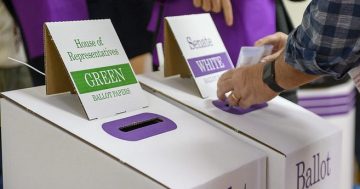Ariel Bogle* says the major Australian political parties are getting inside our inboxes via email tracking tools.
 Politicians want your time and your donations, but they especially want to know if you’ve opened their emails — and perhaps even when, where and on what device.
Politicians want your time and your donations, but they especially want to know if you’ve opened their emails — and perhaps even when, where and on what device.
That’s why there may be something hidden in messages sent from Australia’s political parties, candidates and lobby groups: a 1 x 1 pixel image.
This tiny, invisible picture is an email tracker.
When the email is opened, the pixel is downloaded, potentially letting the sender know a range of details about the recipient.
The ABC found various pixels in campaign emails sent by the Australian Greens, the Labor and the Liberal parties, as well as from lobby groups Advance Australia and GetUp!.
Open tracking is a standard technique used by marketers, as well as by newsletter services deployed by media organisations, including the ABC, but its use in electioneering has privacy experts concerned.
Email was once a simple, relatively trustworthy messaging system that “wasn’t crawling with surveillance and tracking tools”, according to David Vaile, data law expert at the University of New South Wales.
But no longer.
Surveillance is just one part of the picture: Emails often include links that, if clicked, can connect the recipient with the broader Facebook and Google-owned online ad networks common across the internet.
And while political campaigns are increasingly data-driven, Mr Vaile suggested the online practices of Australia’s political parties are largely opaque — thanks, in part, to their exemption from the Privacy Act.
“Not everybody’s aware of this, and if they’re aware of it, they’re not aware of how it’s used,” said James McDonald, head of digital marketing firm Audience Group.
Peeking in your inbox
While the political and lobby groups’ privacy policies largely acknowledge they collect data about voters, there is no way to know if their emails include trackers in advance without using third party warning tools.
Emails sent by Australia’s three major political parties as well as the two advocacy groups employed email open tracking.
“At the bottom of each email, we found a little pixel, which is essentially a little image which pings back to a server,” explained Marcos Caceres, an independent security consultant.
“So, it lets somebody else know ‘hey, this was loaded, this was loaded at this time’.”
Tracking pixels can help refine a political message.
A party can send its email list a variety of subject lines, for instance, and see which policies or angles work for which people.
The Greens acknowledged they “record small amounts of data” when someone opens their emails or clicks a link, stored on their own servers.
Advance Australia said it uses tracking “to ensure that we are communicating with people who actually want to hear from us”, while GetUp! said it “uses standard practices to make sure our supporters receive emails on the issues they care about”.
“The Labor Party uses emails to connect with our supporters and inform them about what is at stake in this election,” a Labor spokesperson said.
Following you across the internet
But keeping tabs on voters in this way can feed into a wider online network.
When someone clicks an email link and is sent to the organisation website, a pixel may be loaded from companies like Facebook or Google.
This may help the website owner to buy an audience from an online ad network.
“[If users] land on one of our web properties a Google and Facebook pixel is placed, and then used to place advertising in order to maximise the funds that our supporters have contributed,” an Advance Australia spokesperson said.
How are you being targeted this election?
Say 1,000 people visit a website to sign an anti-logging petition after being sent an email by an environmental group.
Using these tools, you can see that aggregated cohort also “went to a website that sells canned tuna, looked at a travel agent page recently, hasn’t been to a new car website recently,” Mr McDonald explained.
If you want to reach more people like this, known as a look-alike audience, you can.
If you want the digital ad network not to show people like this ads, you can block them.
Facebook also offers a program called custom audiences, which allows advertisers to target ads using a list of email addresses or even by which page of a website was visited.
Apart from Advance Australia, the other parties and groups did not respond in detail to questions regarding their online ad buying technique.
Tracking the security risk
Some email services try and protect users from trackers by blocking images by default, which means the pixel won’t work.
Nevertheless, email tracking is ubiquitous, and security researchers say the privacy implications are unclear.
A 2018 Princeton University study of email tracking found 70 per cent of the almost 13,000 examined emails contained tracking technology, with varying levels of security.
Australian political parties (but not lobby groups) have access to the electoral roll, which means that combined with data they collect online and offline, they have the potential to create data-rich profiles of Australian voters.
Mr Vaile said we have little visibility of these collections or their security.
A Greens spokesperson said they do not link email tracking data with any larger databases about potential voters.
The party is also concerned about overreach when it comes to online tracking tools, despite their usefulness.
Mr Dixon suggested Australian political parties were still not the most sophisticated digital marketers, but voters were still likely to be caught unaware by how their actions were watched.
“People might vaguely know in the back of their mind, I’m probably being tracked, but I don’t think they realise that anyone can do it,” he said.
The Liberal Party did not respond to request for comment by deadline.
* Ariel Bogle is the online technology reporter in the ABC RN science unit. She tweets at @arielbogle.
This article first appeared at www.abc.net.au.











